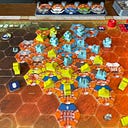The Future of Board Games and AI: An Emerging Player in Design and Gameplay
Before we get into the meat of this topic, I’d be grateful if you would click the “follow” button and leave a like or a comment. All free support from your side encourages more content from me. Win-Win! = )
And now, on with the article.
From the sociable fun of Avalon: The Resistance to the strategic intricacies of On Mars, the world of board games is as vibrant and varied as the players themselves. Yet, with advancements in technology, particularly in artificial intelligence (AI), the board game landscape could become even richer. As a board game blogger, I find it exciting to explore this technological intersection. It’s important to clarify that this exploration isn’t advocating for or against AI but rather examining the potential opportunities it offers to board game designers and players alike.
Looking Back: AI in the Days of Yore
Rewinding to the early days of AI, it was much like computers before the advent of user-friendly operating systems — unwieldy, expensive, and mostly inaccessible to the general public. Notable historical AI models such as IBM’s Deep Blue, which defeated world chess champion Garry Kasparov in 1997, remained largely exclusive to high-level academia and science, presenting little practical relevance for everyday people.
AI Today: Enriching the Board Game Design Process
Fast forward to today, and the scenario has dramatically changed. AI has become more accessible, trickling into a myriad of sectors, including our cherished realm of board games. It’s here, in the design process, where AI could prove to be a game-changer, acting as an always-ready design partner.
AI can streamline the design process by simulating and testing game mechanics, providing invaluable data on balance and gameplay dynamics. This significantly reduces the time and effort required in traditional playtesting, allowing designers to focus more on creativity and innovation. Also, it reduces the reliance on finding large groups of playtesters, which can be a challenge for independent game designers.
Furthermore, AI can assist in brainstorming sessions, generating and evaluating an array of ideas based on predefined game mechanics, themes, and objectives. This can offer designers new perspectives and inspire unique game concepts.
The Intersection of AI and Players
AI’s integration into board games extends beyond design, enhancing the player experience as well. AI can serve as a virtual opponent, offering a challenging gameplay experience without the need for human competitors. Solo players can play whenever they like, with AI opponents providing robust competition in games like Pandemic or Carcassonne.
Gazing Into the Future: The Next Level of Board Games and AI
Looking forward, the collaboration between board games and AI holds immense potential. Imagine adaptive AI opponents that learn and improve over time, offering a dynamic and continually challenging gameplay experience.
AI, in combination with augmented reality (AR), could create interactive game boards and elements that respond to player actions, offering an immersive gaming experience that blends the best of traditional board games and video games.
AI’s ability to assist in making board games more inclusive and accessible also cannot be understated. AI-powered voice recognition could open doors for visually impaired players, enhancing their board game experiences.
However, we must tread this path with care. While AI offers many opportunities, we must remember to maintain the essence of board games — social interaction, laughter, and friendly competition.
A Balanced Viewpoint
While this exploration of the role of AI in board games presents an exciting prospect, it’s crucial to acknowledge that it comes with its own set of challenges. Ensuring that the incorporation of AI does not detract from the social heart of board games is as important as harnessing its potential to enhance game design and play.
Also, it’s important to clarify that we’re not discussing AI designing games autonomously but rather AI assisting in the design process. The human element of creativity and ingenuity remains paramount in board game design.
Wrapping Up
So, fellow board game enthusiasts, we stand on the brink of a fascinating new era, one where AI could serve as both a valuable tool for designers and an ever-ready opponent for players. As we embark on this journey, let’s embrace the possibilities and challenges alike, for the landscape of our beloved board games is set to become even more captivating. Here’s to the roll of the dice and the turn of the card in an exciting new game world!
If you like these types of articles or would like to suggest topics for future articles, feel free to do so in the comments. And until next time, keep gaming!
BoardGameNerd
